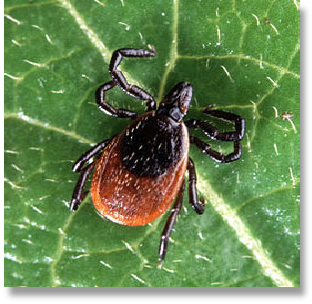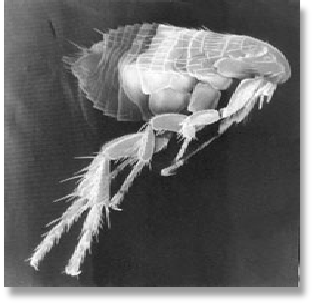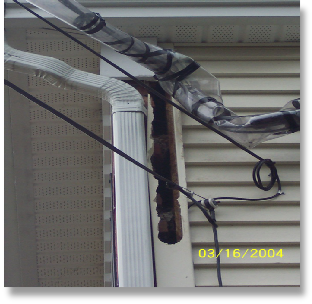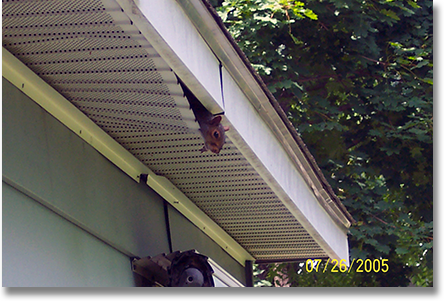Wildlife Health & Safety Risks
 White-footed mice are a common carriers of deer ticks which transmit lyme disease. White-footed mice are a common carriers of deer ticks which transmit lyme disease. |
Disease
Zoonotic diseases or zoonoses are illnesses that people can catch from wildlife or wildlife den sites. When humans share the same den site or living space with wildlife, the potential for the spread of zoonotic disease increases. There are numerous disease related risks that left untreated, may lead to serious or even fatal health issues. A few examples include rabies, raccoon roundworm, histoplasmosis, toxoplasmosis, hantavirus, mange, distemper, and Lyme disease. Transmission of these illnesses varies depending upon the disease.
For example, rabies is normally transmitted via the saliva of the infected animal (bite or scratch) or if spinal cord fluid or brain matter comes in contact with a human. There is also evidence that rabies may be transmitted via the air (inhaling) in caves that bats have occupied for many years. In contrast, Lyme disease is exclusively transmitted from a tick bite. Histoplasmosis, an airborne disease, is caused by inhalation of fungal spores most often found in bat or bird droppings.
The key in preventing zoonotic diseases is to never handle wildlife even if you think the animal is injured or orphaned. Additionally, never allow wildlife to build a stronghold in your home. Always defer to a wildlife professional if animals need to be captured or handled. Wildlife professionals are trained and prepared to handle wildlife safely and to minimize stress on the animal.
 Fleas can be carriers of bubonic plague. Fleas can be carriers of bubonic plague. |
Parasites
All wildlife carry parasites. Round worm and tapeworm are examples of parasites associated with raccoons. Other types of parasites include ticks, fleas, bat bugs, mange, and lice. Some parasites carry disease. Many are very prevalent here in New England (deer ticks carry Lyme disease for example). Other famous parasite-disease connections include rodents, fleas, and the bubonic plague. Typically, problems arise between humans and parasites when there is a high population of animals living in your home or immediately after an animal has been evicted. A high population of animals typically correlates to a high population of parasites. When the animal is evicted, their main host is no longer available so they will migrate to the next available host...humans. The key to preventing all of the above is to be proactive in the mitigation of any animal sharing your living space. The quicker the animals are evicted or removed, the less chance of a high parasite population in your home.
 Significant damage to a house caused by a gray squirrel. Significant damage to a house caused by a gray squirrel. |
Structural Damage
Unfortunately, wildlife has no regard for your property. They chew wires, build nests in ducts, die behind walls, use your home as a toilet, and chew openings to enter your home. Squirrels are responsible for millions of dollars of damage to the electric companies annually. Pigeons cost municipalities and private corporations thousands of dollars from droppings soiling property and people. Homeowners typically experience damage when squirrels or bats enter the attic to stay warm or to raise their young. Attic insulation is regularly soiled and ruined by wildlife fecal material. One of my colleagues speaks of responding to a squirrel call where the animal chewed electrical wires and as a result, electrified the metal roof of the building. In extreme cases, fires may ignite in the building, resulting in a total loss. When wildlife occupies a building, not only is there a financial cost to remove the animal(s), but most times there is additional cost to repair the damage. Again, the formula to prevent all the above is to be proactive if you suspect wildlife is entering or using your home or building.
 Squirrel taking up residence in eaves. Squirrel taking up residence in eaves. |
 Raccoon taking up residence in roof. Raccoon taking up residence in roof. |
Contact Suburban Wildlife Control, LLC for all of your wildlife and insect control needs.
Fill out the contact form below or use the contact information to reach us.
CONTACT INFO:
Suburban Wildlife Control, LLC.
(877) 881-5230 Toll free
(603) 881-5230


